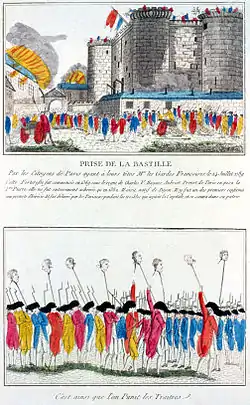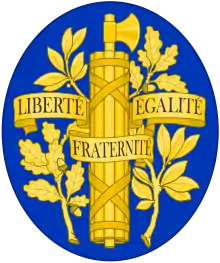Public holidays in France
There are 11 official public holidays in France.[1] The Alsace region and the Moselle department observe 2 additional days.[2] Unlike most countries, these holidays do not shift when they fall during a week-end,[3] which means that the average number of observed public holidays falling on weekdays is 8.7 and ranges from 7 to 10.[4] Most Asian countries and all North American countries observe between 2 and 10 more public holidays per year on weekdays.[5]
| Part of a series on the |
| Culture of France |
|---|
| People |
| Cuisine |
| Festivals |
| Religion |
| Art |
| Literature |
| Sport |
|

Public holidays in France are:
| Date | English name | Local name | Remarks |
|---|---|---|---|
| 1 January | New Year's Day | Nouvel an / Jour de l'an / Premier de l'an | |
| moveable | Good Friday | Vendredi saint | Friday before Easter Sunday. Alsace and Moselle only.[6] |
| moveable | Easter Monday | Lundi de Pâques | Monday after Easter Sunday (one day after Easter Sunday) |
| 1 May | Labour Day | Fête du Travail | |
| 8 May | Victory Day | Fête de la Victoire | End of hostilities in Europe in World War II |
| moveable | Ascension Day | Ascension | Thursday, 39 days after Easter Sunday |
| moveable | Whit Monday | Lundi de Pentecôte | Monday after Pentecost (50 days after Easter), observed only in some businesses, see notes |
| 14 July | Bastille Day | Fête Nationale | French National Day, commemorates the Feast of the Federation |
| 15 August | Assumption of Mary | Assomption | |
| 1 November | All Saints' Day | Toussaint | |
| 11 November | Armistice Day | Armistice de 1918 | End of World War I.[7] |
| 25 December | Christmas Day | Noël | |
| 26 December | Saint Stephen's Day | Deuxième jour de Noël | Alsace and Moselle only.[8] |
Notes
See Fêtes et jours fériés en France (Wikipedia page in French), to have all the dates (French Overseas Departments (DOM) added).
Note: French law dictates that work should stop, but be paid, only for the Fête du Travail (May Day, 1 May),[9] except in industries where it is infeasible to stop working.[10] The rest of the public holidays are listed in statute law,[11] but law does not dictate that work should stop; however a leave from work may be granted by the employer or by convention collective (agreement between employers' and employees' unions).
In 2005, French prime minister Jean-Pierre Raffarin removed Pentecost (Whit) Monday's status as a public holiday. This decision was eventually overruled by French courts in 2008. Employers are free to decide whether to make Whit Monday a day off or not.[12]
References
- French labor law, L3133-3
- French labor law, IDCC 1686
- French labor law, IDCC 1686
- French wikipédia
- Employee holiday entitlement around the world, Mercer
- "Jours fériés dans la fonction publique".
- "France Public Holidays in 2021".
- "Jours fériés dans la fonction publique".
- Code du Travail, L3133-4
- Code du Travail, L3133-6
- Code du Travail, L3133-1
- LOI n° 2008 – 351
